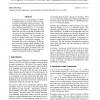Free Online Productivity Tools
i2Speak
i2Symbol
i2OCR
iTex2Img
iWeb2Print
iWeb2Shot
i2Type
iPdf2Split
iPdf2Merge
i2Bopomofo
i2Arabic
i2Style
i2Image
i2PDF
iLatex2Rtf
Sci2ools
134
Voted
ICML
2000
IEEE
2000
IEEE
Convergence Problems of General-Sum Multiagent Reinforcement Learning
Stochastic games are a generalization of MDPs to multiple agents, and can be used as a framework for investigating multiagent learning. Hu and Wellman (1998) recently proposed a multiagent Q-learning method for general-sum stochastic games. In addition to describing the algorithm, they provide a proof that the method will converge to a Nash equilibrium for the game under specified conditions. The convergence depends on a lemma stating that the iteration used by this method is a contraction mapping. Unfortunately the proof is incomplete. In this paper we present a counterexample and flaw to the lemma's proof. We also introduce strengthened assumptions under which the lemma holds, and examine how this affects the classes of games to which the theoretical result can be applied.
General-sum Stochastic Games | ICML 2000 | Machine Learning | Multiagent Q-learning Method | Stochastic Games |
Related Content
| Added | 17 Nov 2009 |
| Updated | 17 Nov 2009 |
| Type | Conference |
| Year | 2000 |
| Where | ICML |
| Authors | Michael H. Bowling |
Comments (0)

